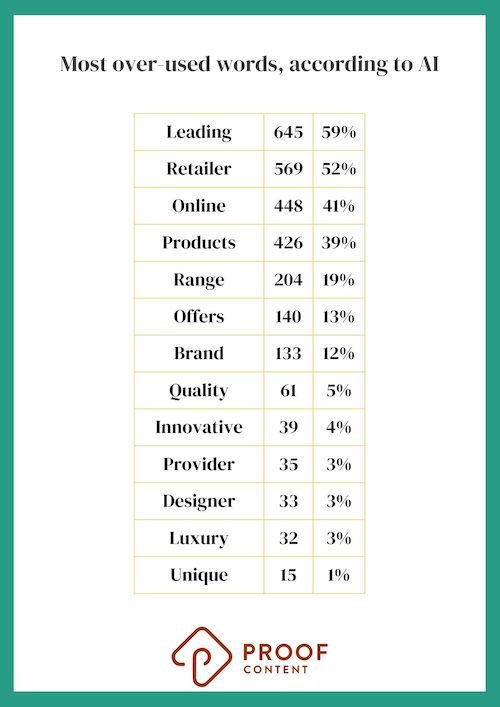Having a clear tone of voice and a well written About Us page is one of the most important elements of a website. While creating merchant descriptions for a client we came across several over-used words on some of the UK’s biggest companies’ websites. So we set about creating a guide to help you avoid using them.
Our AI tool analysed more than 1,000 of the UK’s biggest retailers. 1,086 to be exact. We asked it to write a couple of sentences about each company for a client’s cashback site – zellebrate. It uses over 175 billion parameters, but prioritises information from the business’s own website to inform its content.
The results have been revealing. It seems that companies often have difficulty describing themselves in a way that sets them apart from competitors, gives clear reasons for customers to buy from them and encourages loyalty to the brand.
We’re here to help you stop making those same mistakes by showing you what’s been overused.

If your website users are visiting your About Us page, they’ve probably bought into your services or products, or they want to work for or invest in the business. They’re likely to be almost at the end of your customer journey funnel and are usually highly interested in your company. Or they’re about to make their purchase decision and need a little reassurance.
They don’t want to find out you are one of almost 60% of companies who think they’re leading. The fact that you are a leading company is also likely to be irrelevant to them. Instead, try to answer these questions: Why are you leading? Do you have the best service? Do you have the most products? Or do you have the most customers? And if you have the most customers, why is that relevant to new customers, what does it mean for them?
Your customers already know you’re a retailer – that’s why they’re on your website. If you think website users may doubt whether you sell products online, then link to some products or another page customers can buy from.
Instead of using the space telling your users you’re a retailer, spend it defining what type of retailer you are and what that means for them.
If your users are on your website, they’re already online, so chances are they know you are too. The About Us page is valuable real estate, and taking it up telling people you’re online when they’re already on your website is a waste of space.
Instead, spend the time telling customers what your values are, what you do best and why you exist.
Most retailers do offer a wide range of products or services, so it may seem logical to use the word. But alternative ways to get this message across can have a more positive impact. For example, using the word ‘options’ or ‘choices’ brings it back to why having a wide range is important to the customer – it gives them a huge choice.
It’s also important not to overwhelm customers with too many visible products. Amazon, for example, sells over 12 million products, but the reason we shop there is because they make it so easy to choose which of the products we want to buy. Having helpful shopping guides, a well-designed website and ways to filter through the selection are far more important to customers than you pointing out that you have a wide range.
Quality is an overused term that doesn’t have any qualifiers. It is also often a signal that something isn’t good quality.
Do you really need to tell your customers your products are good quality? If your values, wording and products are good enough, they should speak for themselves.
Try showing your customers the quality of your products with user reviews, testimonials and videos of the product in action. You could also use relevant data, perhaps showing how long the product lasts or how many customers come back to you after an initial purchase.
The word innovative hit an all-time high in the last 10 years. Luckily, that seems to be dying down now. But unfortunately, it’s left ‘innovative’ as a redundant word many of us can barely remember the meaning of.
If you are innovative or pioneering or forward thinking – how? What are you working on that’s new? What did you create that is original or exciting? We often speak to people who feel their company hasn’t done anything worth talking about, but after our introductory calls, we find there’s lots to shout about and so much that’s unique. It just takes an outside expert to draw it out and show your customers what you can offer.
Want your copywriting to stand out from the rest? Get in touch.
For copy that hits your KPIs you need the right words in the right places. Solve tricky business challenges with a clever copywriting process.

We are powered by writers and business people, with a sprinkle of AI and a healthy dollop of clever processes.
Get our lovely jubbly tips and tricks and useful writing licks:
